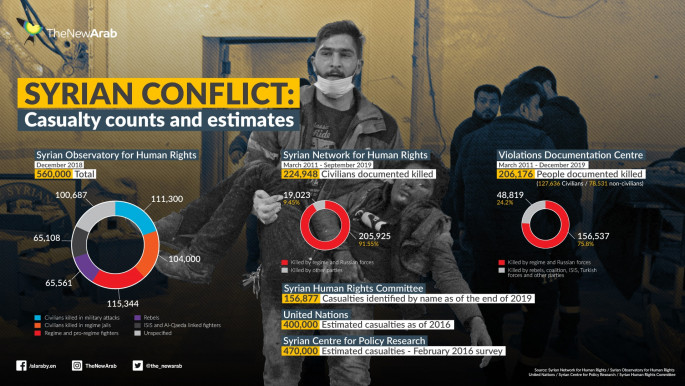Poll finds 90 percent of Syrians who fled Idlib would not return to Assad-held areas
A poll of 150 people who left Idlib following an intensification of fighting found that 90.6 percent would not consider returning to Assad-held areas or entering reconciliation agreements under Russian guarantees, according to the Syrian Association for Citizens' Dignity (SACD), a grassroots civil rights movement started by Syrians.
The poll was conducted in the border areas, including Atma village and Adana, with people who fled regions of intense clashes including Idlib city and Maarat Al-Numan.
Taking to Twitter to share its findings, the organisation wrote: "Inhabitants of these places don't want to stay under Assad's rule in mortal fear of the militias under his control who are known to have executed civilians in the newly captured areas.
They are certain to be targeted if they fall under the Russian and regime control."
Read More: Idlib: A Syrian tragedy foretold
It added: "They are desperate to cross into Turkey and continue towards Europe in search of safety for their children. The consequences on the region and Europe itself of this massive displacement are difficult to estimate."
|
'Forced returns'
Turkey has come under fire for forcibly deporting Syrian refugees back to the country on the pretext that it will create a "safe zone".
Turkey spent the months leading up to its military incursion into northeast Syria forcibly deporting refugees to the war-torn country, in advance of attempting to create a so-called "safe zone" on the Syrian side of the border, Amnesty International said last year.
"Turkey's claim that refugees from Syria are choosing to walk straight back into the conflict is dangerous and dishonest. Rather, our research shows that people are being tricked or forced into returning," said Anna Shea, Researcher on Refugee and Migrant Rights at the human rights organisation.
"Turkey deserves recognition for hosting more than 3.6 million women, men and children from Syria for over eight years, but it cannot use this generosity as an excuse to flout international and domestic law by deporting people to an active conflict zone."
It is illegal to deport people to Syria as it exposes them to a real risk of serious human rights violations.
"It is chilling that Turkey's deal with Russia this week agrees to the 'safe and voluntary return' of refugees to a yet to-be-established 'safe zone.' Returns until now have been anything but safe and voluntary – and now millions more refugees from Syria are at risk," said Anna Shea.
'Humanitarian crisis'
The United Nations said on Tuesday that more than half-a-million people had been displaced from Idlib province in the past two months, following a ferocious Russian and regime assault which had brought regime forces within a few kilometres of Idlib city.
The UN also expressed "alarm" over deadly clashes between Turkish and Syrian regime troops in Idlib province in northwest Syria and called for immediate de-escalation and the resumption of negotiations.
 |
|
| Click to enlarge |
"Since 1 December, some 520,000 people have been displaced from their homes, the vast majority - 80 percent - of them women and children," David Swanson, spokesman for the UN Office for the Coordination of Humanitarian Affairs, said.
The wave of displacement is one of the largest since the start of the Syrian conflict nearly nine years ago.
"This latest displacement compounds an already dire humanitarian situation on the ground, when over 400,000 people were displaced from the end of April through the end of August, many of them multiple times," Swanson said.
Regime troops and militia backed by Russian and other allied forces have in recent weeks pursued a ferocious assault on Idlib province and neighbouring areas of northwestern Syria, which constitute the last parts of Syria still held by anti-Assad rebels.
They have captured dozens of villages and some major towns - including the city of Maarat Al-Numan, which has been a centre of opposition to the regime since 2011- and are pushing northwards, sending displaced populations ever closer to the Turkish border, which remains closed.
Another UN spokesman, Stephane Dujarric was concerned about Turkish involvement.
"We're very much alarmed by the reports that we saw of clashes between Syrian government troops and Turkish forces in northwest Syria," he told reporters.
Follow us on Twitter and Instagram to stay connected





 Follow the Middle East's top stories in English at The New Arab on Google News
Follow the Middle East's top stories in English at The New Arab on Google News
![Israeli forces ordered bombed Gaza's Jabalia, ordering residents to leave [Getty]](/sites/default/files/styles/image_330x185/public/2176418030.jpeg?h=a5f2f23a&itok=_YGZaP1z)

